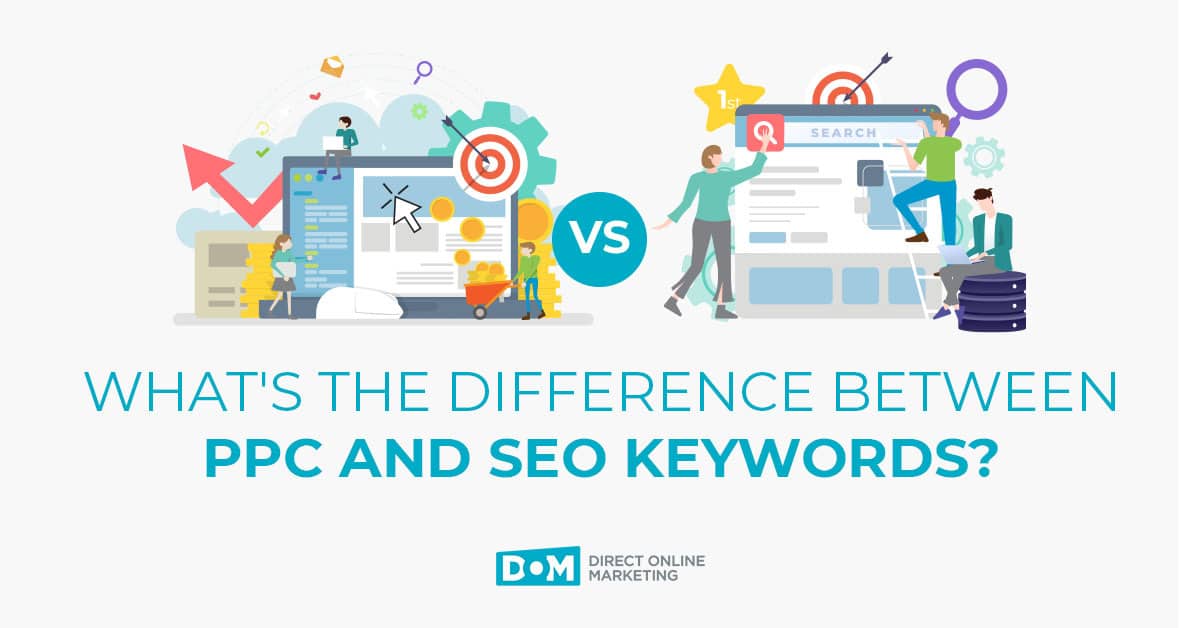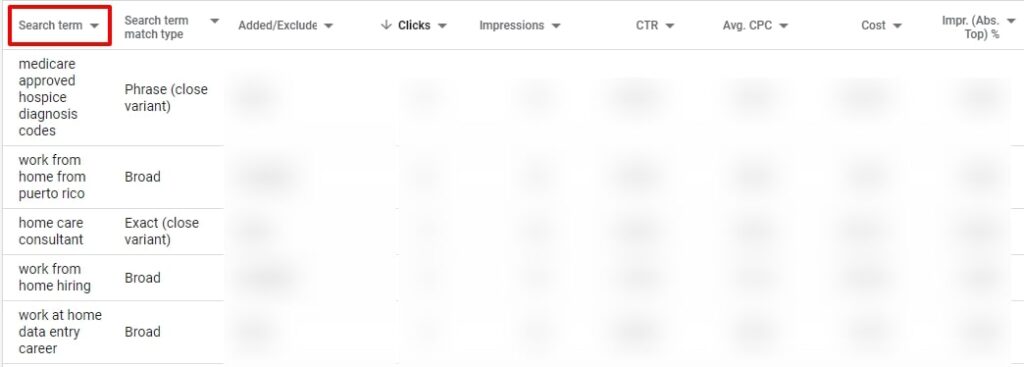
As an agency that supplies a menu of different digital marketing services, we find ourselves talking A LOT about SEO keywords and PPC keywords.
We use keywords all over the place, and they serve as the foundation of nearly every campaign we launch. Whether we are deploying Google Ads, cleaning up content for SEO, or helping client products be found on Amazon… keywords are at the heart of how we connect our clients with their ideal prospects and customers.
At the beginning of any campaign focused around a search, you should plan to invest a significant amount of time scrolling through spreadsheets of keyword terms. Much of this process can be automated, but a human review is still needed to properly determine keyword relevance. Before building any search advertising campaign or writing page and product titles on your website, consider keyword review a “must do.”
If you are using software or online tools like SEMRUSH, Spyfu, or Google Keyword Planner for keyword research, you may notice some differences in the reports depending on the campaign you want to set up.

What’s the Difference Between SEO Keywords and PPC Keywords?
In the context of an SEO campaign, a keyword is the phrase a searcher types into the browser to be provided a list of results. Examples of “SEO keywords” may include results that look like:
- accounting software
- Quickbooks for self employed workers
- online bookkeeping solutions
By contrast, PPC campaign keywords are generally divided into four groups:
- Broad match
- Phrase match
- Exact match
- Negative match
Examples of “PPC keywords” may include results that look significantly different from their SEO counterparts. To enable a PPC ad to be shown for the same SEO keyword searches we listed above, PPC keywords in your Google Ads account will often look something like this:
- Broach match: accounting
- Phrase match: “Quickbooks self employed”
- Exact match: [online bookkeeping solutions]
- Negative match: “learning”
If your software is providing you with two wildly varied keyword lists, these differences in definition by campaign may be the reason why.
Learn everything you ever wondered about the differences between SEO keywords and PPC keywords below.
How Do You Define the Phrases Typed Into the Search Bar in Google Ads?
Believe it or not, this is one of the most common questions we get when going through the keyword research process with our clients and new hires.
In Google Ads, the actual term a searcher types into the search bar is called – you guessed it – a search term.
Search terms in Google Ads are the actual phrase that resulted in the display of your ad. If you are seeking the Google Ads equivalent of an SEO keyword phrase, this is what you are looking for, or need to ask your advertising specialist to provide you.
Why Do You Need to Have Two Separate Keyword Lists?
Besides their obvious physical appearances, it is helpful to think about what these keyword phrases are meant to do in their respective campaigns. After all, each keyword list does a different job even though you will see some overlap. For example, every exact match keyword phrase in a PPC keyword report should also be present in your SEO keyword report (minus the brackets).
Using the accounting software scenario from above which illustrates the difference between these keywords, let’s pretend the word “accountant” appeared in both lists.
You may be thinking “so far, so good” right?
Our response?
- For your PPC keyword list: “yes,” if you intend on running it as a broad match term.
- For your SEO keyword list: “no”
In this scenario, the obvious choice was not necessarily the right one. In your SEO keyword list, the 1-word keyword phrase accountant wouldn’t make sense because you are trying to get your content in front of potential buyers of an accounting software. Alternatively, this term could be good to add to your PPC keyword list as a broad match term to help position your ads for search queries like:
- software for accountants
- Quickbooks accountant certified web tools
- bookkeeping solutions for an accountant
Regardless of Strategy, Keyword Selection is all about Intent
Let’s take the accountant search one step further. If you search for “accountant” on Google, what are you going to be looking for?
- The definition of the word?
- Information on how to become an accountant?
- An accountant to help with your income taxes?
- The average salary of accountants?
You’re not 100% sure, are you?
Guess what? If you’re not really sure, Google can’t be either.
The single word search of the word “accountant” is pretty broad. As a result, Google is going to serve you a wide variety of links about the topic of an “accountant” in an effort to make its best effort to serve you something useful.
If it wouldn’t be a good idea for you to just put that word into the search bar, it may also be a bad idea to prioritize a keyword term like that in your keyword research for your campaigns.
Instead, you’re going to want to use more words than that to further define where you want your content to be found and your ads to be shown.
More Traffic Means More Growth.
See How This SaaS Turned SEO Into It’s Top Traffic And Leads Source.
Why Do I Need a Specific List of SEO Keywords?
SEO is a mix of art and science. You might even say it’s become more of an art over the years, since the Google algorithm is so varied and its specific ranking factors so opaque. Over the 20-plus years Google has been serving its users with the best results it can find, the algorithm has become more and more complicated as the “world wide web” has become larger and more complex.
The primary use for keywords in SEO is to help Google understand the topic of your content and help it get indexed with accuracy. The content Google indexes every day encompasses an entire constellation of topics, but the right keywords placed in top priority areas increases the chance the content you created becomes a star.
How To Use SEO Keywords To Create A Ranking Page For Accounting Software
You know you want your page to rank for “accounting software,” so you start creating a list ranking the 200+ software solutions available in this industry to drive traffic to your site. You want to cast a wide net because you don’t always know the exact sequence of decisions that will lead someone to visit your pages.
While there are a lot of terms related to accounting software, below is a sampling of five of the keywords you might incorporate into an SEO-friendly page optimized for that term:
- Accounting software
- Accounting software list
- Top 10 accounting software
- Desktop accounting software
- SaaS accounting software
There are 100s of keyword variations related to accounting software, but if you optimize your content around these closely related terms, Google will clearly understand the topic and help it get indexed with accuracy.
To rank for additional terms related to accounting software (construction accounting software, church accounting software, nonprofit accounting software), you will need to create pages that are similarly optimized.
One SaaS Saw It’s Page 1 Keywords Double Thanks To Posting And Sharing.
Here’s How We Helped.
Why Do I Need a Specific List of PPC Keywords?
PPC keywords also require a mix of art and science, too, but the application of the art and science is different.
For a successful SEO campaign, you need multiple pages of content optimized for keywords that are closely related. For a successful PPC campaign, you don’t always need multiple pages of content. A compelling ad formatted with keywords used in the right positions can generate clicks to one landing page REGARDLESS of how many keywords you decide to use in your campaign.
How To Use PPC Keywords To Create A Page Shown For Accounting Software
You know you want to get the word out about your new free trial offer when people search for “accounting software.” You create a landing page promoting your free trial. You want to cast a wide net because your software can serve businesses in multiple industries and stages of maturity.
While the content of the page you are sending traffic to is important, the page itself doesn’t have to mention the phrase accounting software anywhere to be shown in a PPC campaign to start generating clicks.
Instead, if you want your page to show up in Google using the PPC method to generate traffic for a sampling of five of the keywords like:
- Accounting software
- Accounting software list
- Top 10 accounting software
- Desktop accounting software
- SaaS accounting software
You need to incorporate the phrase accounting software into three areas of your ad copy:
- The ad headline
- The ad copy
- The landing page URL
If your keyword phrase is incorporated into those three areas of your ad copy, and you have the phrase accounting software setup as a keyword term in your Google Ads account, you should begin seeing traffic sent to your free trial offer within a day or so.
‘Spray And Pray’ Won’t Work Today.
Learn How This Bank’s Leads Grew 96%
Thanks To Custom Ad Targeting.
There Are Even More Differences Than That
To recap, SEO keywords and PPC keywords share several major differences:
- SEO keywords are the equivalent of PPC search queries.
- PPC keywords have three distinct styles: broad match, phrase match, and exact match.
- PPC keywords serve as the equivalent to SEO search themes.
- SEO keywords matter more inside the content of a webpage.
- PPC keywords matter more inside the ad copy the search engine displays.
Those five major differences may seem trivial, but they are important to understand as you embark on a campaign to grow your business confidently using search engine marketing. No matter how you choose to use keywords, the goal should always be the same: to earn you conversions.
Are conducting keyword research? Are you revising your campaign approach because the keywords you’re targeting aren’t generating the results you need?
If your answer to either of the above questions is ‘yes,’ then you could probably use a free audit from Direct Online Marketing. Contact us to get started.



